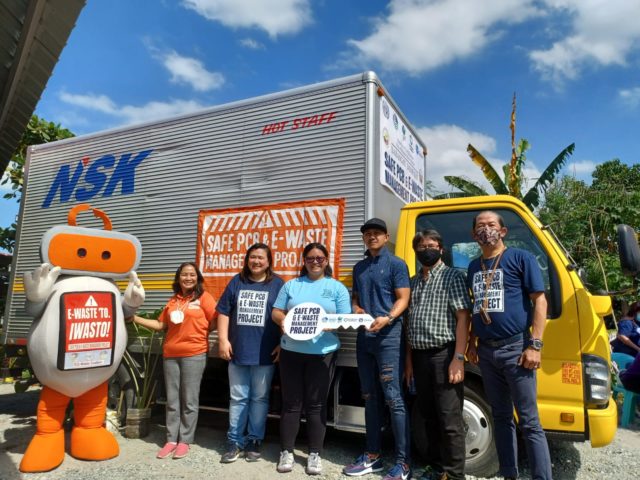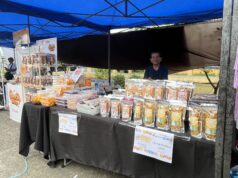Informal electronic waste recycling has been a source of livelihood for several residents in barangays Dampalit and Longos in Malabon, and Capulong in nearby Tondo, Manila. Several mangangalakal or waste trader associations collect and dismantle unwanted electrical and electronic equipment such as Cathode Ray Tube (CRT) TVs, refrigerators, electric fans, and cell phones to salvage precious metals and other valuable parts they can sell.
Due to toxic materials found on e-waste like polybrominated diphenyl ether (PBDE), bromine, and other heavy metals i.e. mercury, lead, cadmium, barium, and beryllium, the unsupervised dismantling process can be dangerous to the recyclers, the community, and the environment – which can affect their health and expose them to environmental hazards, if not handled correctly.
But there is hope for these informal e-waste communities to transition into a safe working environment. Globe Telecom Inc., the United Nations Industrial Development Organization (UNIDO), the Department of Environment and Natural Resources (DENR), Integrated Recycling Industries, Inc., the Ecological Waste Coalition of the Philippines (EcoWaste Coalition), and the local government unit through the Global Environmental Facility (GEF) funded project entitled, “Implementation of Polychlorinated Biphenyls (PCB) Management Programs for Electric Cooperatives and Safe E-waste Management,” have come together to upgrade the Materials Recovery Facility (MRF) of Barangay Dampalit in Malabon to a community-based Treatment, Storage, and Disposal (TSD) Facility for e-waste.
With the establishment of the TSD facility, informal e-waste recyclers will be given proper training to address concerns over informal e-waste processing and its associated risks to human health and the environment. Once it starts full operations this March, the facility aims to process at least 15,000 CRTs or glass video displays from computers and television sets.
Barangay Dampalit has six active mangangalakal groups and two junk shops, while Barangays Longos and Capulong, Tondo have associations of waste recyclers with more than 50 active members in total.
With Globe’s support, the waste recyclers working for the community-based TSD now have resources to jumpstart the operations of the facility and the means to safely collect and transport non-CRT e-waste items. Globe will also co-develop a communications campaign to further strengthen the importance of proper e-waste disposal.
“At Globe, we understand the value and importance of proper e-waste management,” said Apple Evangelista, Globe’s Head for Sustainability and Social Responsibility.
She added, “This facility is a milestone for e-waste recycling in the Philippines – we believe that with its integration in Barangay Dampalit’s waste management system, this contributes to improving the well-being of the recyclers, their family, and their community since dismantling will be done in an appropriate e-waste facility and workers are armed with knowledge on proper handling.”
The TSD is part of Globe’s E-waste Zero program, which promotes the safe and responsible disposal of e-waste since 2014. To date, Globe has collected more than 1.4 million kilograms of old and non-working electronic devices from its corporate offices and key facilities, individual customer contributions, and more than 80 partner organizations, schools, and local governments. In 2020, E-waste Zero was also recognized by the GSMA as one of the global best practices for e-waste take back and collection efforts.
Integrated Recycling Industries Philippines (IRI) will provide training and technical support to the waste recyclers of the TSD, while EcoWaste Coalition will conduct awareness raising activities.
EcoWaste Coalition is a non-profit environmental health network of over 140 public interest groups advocating for a “zero waste and toxic-free society where communities can enjoy a safe and healthy environment.” To advance its mission, EWC works with the government, industry, civil society, healthcare sector, the consumer movement, and other stakeholders.
The TSD in Barangay Dampalit is the second community-based facility for e-waste aimed to help informal e-waste recyclers. The first facility was created in Barangay Bagong Silang, Caloocan City, last year, with eight personnel hired in the facility and 20 E-waste Busters coming from the four project sites namely Barangay Bagong Silang and Barangay Camarin in Caloocan City, Barangay Longos in Malabon, and Barangay Capulong in Tondo.
“With the success of the e-waste facility in Bagong Silang, Caloocan City, we had envisioned extending this project to other local communities. With the help of our partners, we were able to set up the new facility in Barangay Dampalit, Malabon in record time and with overwhelming support,” said Dr. Carmela Centeno, Project Manager, UNIDO Headquarters.
Barangay Captain Carlo Jay R. Dumalaog of Barangay Dampalit expressed his excitement over the facility’s inauguration in their community, saying: “We are blessed to have been chosen as one of the sites for this project. We are grateful for the opportunities that this facility can create for our residents and believe that this site will not only benefit our community but others nearby as well.”
Similarly, Engr. Marcelino Rivera, Jr., EQMD Chief of DENR-Environmental Management Bureau, hopes that this project will be replicated in other areas. He shared, “The DENR-EMB is committed to supporting local communities who are ready to expand their waste management processing to cover e-wastes. Our collaboration with our partners from the private and development sector is proof that we can work together to make a difference in environmental care and conservation.”
In January 2019, the UN Environment Programme reported that only 20% of e-waste is recycled, many of which by hand in developing countries, exposing workers to hazardous and probable carcinogenic substances. The other 80% end up in landfills, polluting the environment and putting nearby human settlements at risk.
In line with its commitment to continuously advocate for safe e-waste management, Globe also deployed an E-Waste Zero bin on October 29, 2021 at the United Nations House, Manila, which happened to coincide with the UN month celebration. Eight additional bins were also deployed to DENR, as well as Barangays Dampalit and Bagong Silang last December to encourage their employees as well as the local communities to participate in responsible recycling of their personal e-waste. A collection drive was held from February 14-28 of this year at the DENR premises, wherein more than 200 employees donated their e-waste – as big as air conditioning units and as small as old cables and cell phones.
To support the campaign against e-waste and help divert e-waste to proper recycling facilities, Globe encourages the public to drop their e-waste items in participating Globe stores nationwide. For a complete list of drop-off points or to request free door-to-door hauling of e-waste, visit Globe’s Sustainability website https://www.globe.com.ph/about-us/sustainability/environment.html. For organizations wanting to partner with Globe, email bridgecom@globe.com.ph.
Globe’s participation in the PCB and e-waste management program strengthens its commitment to the United Nations Sustainable Development Goals, specifically, UN SDG No. 12 on Responsible Consumption and Production, which is about achieving economic growth and sustainable development by urgently reducing the ecological footprint, increasing resource efficiency, and promoting sustainable lifestyles. Globe remains committed to upholding the UN Global Compact principles and contributing to 10 UN SDGs.
To know more about Globe’s sustainability initiatives, visit https://www.globe.com.ph/about-us/sustainability.html.





